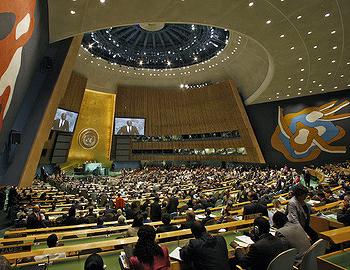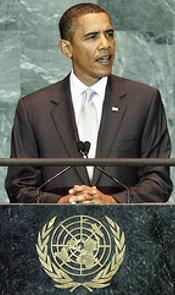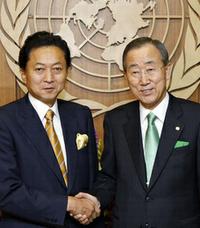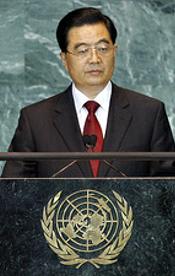World Leaders Pledge to Accelerate Climate Change Action
NEW YORK, New York, September 22, 2009 (ENS) - "Climate change is the pre-eminent geopolitical and economic issue of the 21st century. It rewrites the global equation for development, peace and security," said UN Secretary-General Ban ki-Moon today at the Climate Change Summit he convened at UN Headquarters in New York.
Ban urged the more than 100 assembled world leaders to speed up their action on global warming and preserve the planet for future generations. He countered those who claim that addressing global warming comes at too high a price.
 |
"They are wrong," said Ban. "The opposite is true. We will pay an unacceptable price if we do not act now."
The UN Climate Change Summit takes place 75 days before the start of the Copenhagen conference, where nations are expected conclude negotiations on an ambitious new agreement to curb greenhouse gas emissions that would go into effect at the end of 2012 when the Kyoto Protocolís first commitment period expires.
In his first address at the United Nations, President Barack Obama said, "The threat from climate change is serious, it is urgent, and it is growing. Our generation's response to this challenge will be judged by history, for if we fail to meet it - boldly, swiftly, and together - we risk consigning future generations to an irreversible catastrophe."
President Obama acknowledged that in the past the United States has been slow to recognize the magnitude of the climate threat. "But this is a new day," he declared. "It is a new era. And I am proud to say that the United States has done more to promote clean energy and reduce carbon pollution in the last eight months than at any other time in our history."
As the Copenhagen conference approaches, Obama said the world "cannot allow the old divisions that have characterized the climate debate for so many years to block our progress."
"Yes," Obama said, "the developed nations that caused much of the damage to our climate over the last century still have a responsibility to lead, and that includes the United States. And we will continue to do so, by investing in renewable energy and promoting greater efficiency and slashing our emissions to reach the targets we set for 2020 and our long-term goal for 2050."
In Italy in July, the G8 industrial democracies, including the United States, agreed to reduce their greenhouse gas emissions by 80 percent by 2050. The United States intends to reduce its emissions by 17 percent by 2020, compared with a 2005 baseline.
President Obama today called on "rapidly growing developing nations that will produce nearly all the growth in global carbon emissions in the decades ahead" to do their part to protect the climate.
 |
President Barack Obama addresses the Climate Change Summit (Photo courtesy UN) |
"Some of these nations have already made great strides with the development and deployment of clean energy," Obama said. "Still, they need to commit to strong measures at home and agree to stand behind those commitments just as the developed nations must stand behind their own."
"We cannot meet this challenge unless all the largest emitters of greenhouse gas pollution act together," said Obama. "There's no other way."
On Thursday in Pittsbugh, Pennsylvania, Obama is convening the leaders of the Group of 20 nations - both developed and developing countries - to strengthen and stabalize the fragile global economy.
He announced today that the G20 will address the government subsidies that give the fossil fuel industries - coal, oil and gas - an economic advantage.
"Later this week, I will work with my colleagues at the G20 to phase out fossil fuel subsidies so that we can better address our climate challenge," the President said.
Briefing reporters after Obama's speech, the U.S. Envoy for Climate Change Todd Stern said, "Energy subsidies have a significant impact on energy security, on climate change, on competitiveness, on health, and as well as on government finances. And it's an area that the G20 is considering taking action on."
The President pledged to help provide the financial and technical assistance needed to help the poorest and most vulnerable of developing nations "leap-frog dirty energy technologies and reduce dangerous emissions."
 |
Yukio Hatoyama, Prime Minister of Japan, meets Secretary-General Ban ki-Moon (Photo by Evan Schneider courtesy UN) |
These least developed nations have the most immediate stake in a solution, Obama said. "For these are the nations that are already living with the unfolding effects of a warming planet - famine, drought, disappearing coastal villages, and the conflicts that arise from scarce resources," he said. "Their future is no longer a choice between a growing economy and a cleaner planet, because their survival depends on both."
What we are seeking, after all, is not simply an agreement to limit greenhouse gas emissions," said Obama. "We seek an agreement that will allow all nations to grow and raise living standards without endangering the planet."
In his first UN address, the new Japanese Prime Minister Yukio Hatoyama pledged to cut greenhouse gas emissions by 25 percent by 2020 from 1990 levels. He too proposed to offer technological and financial support to developing nations to help tackle climate change.
To achieve the 2020 target, Hatoyama pledged to introduce a domestic emission trading system and a tariff for renewable energy, as well as considering a global warming tax.
"It was an historic and strong commitment, particularly from Japan," said Secretary-General Ban.
But Hatoyama, who took office just six days ago, said Japan will not obligate itself to realizing the 25 percent goal unless all major emitters also agree on deep greenhouse gas emissions reductions.
"The commitment of Japan to the world is premised on agreement on ambitious targets by all the major economies," he said.
Chinese President Hu Jintao told the assembly that "out of a sense of responsibility to the world" his government will intensify efforts to conserve energy and improve energy efficiency, and endeavor to cut carbon intensity "by a notable margin by 2020 from the 2005 level."
 |
Chinese President Hu Jintao (Photo by Marco Castro courtesy UN) |
"Second, we will vigorously develop renewable energy and nuclear energy," said the Chinese President. "We will endeavor to increase the share of non-fossil fuels in primary energy consumption to around 15 percent by 2020."
Third, Hu said China will work to increase forests to absorb carbon dioxide from the atmosphere, saying, "We will endeavor to increase forest coverage by 40 million hectares and forest stock volume by 1.3 billion cubic meters by 2020 from the 2005 levels."
"Fourth, we will step up effort to develop green economy, low-carbon economy and circular economy, and enhance research, development and dissemination of climate-friendly technologies," Hu said.
French President Nicolas Sarkozy proposed that heads of state from major economies meet again in November to discuss the climate change agenda ahead of the Copenhagen conference
"Considering how complex this negotiation is, a new summit before Copenhagen is needed," Sarkozy told his counterparts.
Sarkozy said a November meeting would allow the world's biggest emitters "to make clearer commitments to ensure Copenhagen's success."
 |
Mohamed Nasheed, President of the Republic of Maldives (Photo by Marco Castro courtesy UN) |
The leader of the Maldives, an Indian Ocean country of 1,200 low-lying tropical coral islets, issued an impassioned plea for urgent action on behalf of his 400,000 citizens who are at risk of rising sea levels and storm surges.
President Mohamed Nasheed expressed hope that this summit would not fall into the predictable pattern whereby nations pledge action at international gatherings, only to forget about their commitments.
"We at the Maldives desperately want to believe that one day our words will have an effect, and so we continue to shout them even though, deep down, we know that you are not really listening," he said.
Dr. Rajendra Pachauri, who chairs the Nobel Peace Prize-winning Intergovernmental Panel on Climate Change, had a stern warning for the government leaders assembled at the UN.
"If we do not act on time, all of us will become the leaders and citizens of failed states, with the potential of conflict rising due to lack of food and other resources."
Limiting temperature surges to 2 to 2.4 degrees Celsius will only slow economic growth targets by a few months, Pachauri emphasized, adding that climate mitigation also brings a wealth of benefits, including lower air pollution and stable agricultural production.
President Obama appealed to the conscience of every world leader assembled at UN Headquarters to act quickly. "No nation, however large or small, wealthy or poor, can escape the impact of climate change. Rising sea levels threaten every coastline. More powerful storms and floods threaten every continent. More frequent droughts and crop failures breed hunger and conflict in places where hunger and conflict already thrive. On shrinking islands, families are already being forced to flee their homes as climate refugees."
"The security and stability of each nation and all peoples - our prosperity, our health, and our safety - are in jeopardy," Obama warned." And the time we have to reverse this tide is running out."
Copyright Environment News Service (ENS) 2009. All rights reserved.
To subscribe or visit go to: http://www.ens-newswire.com